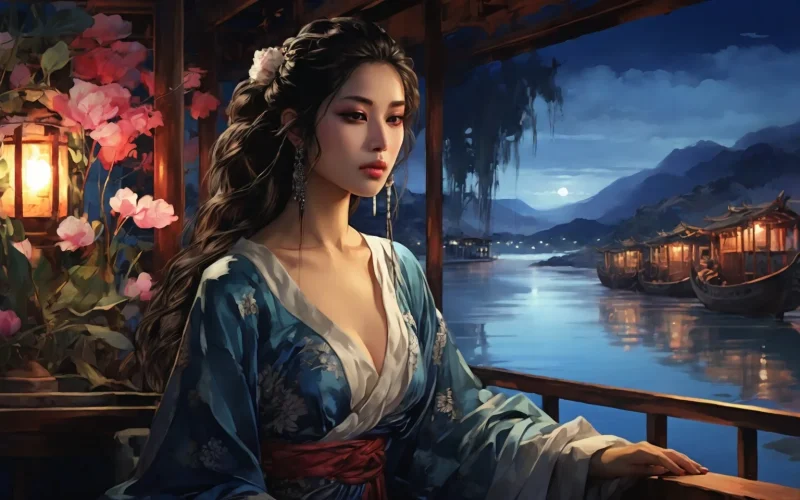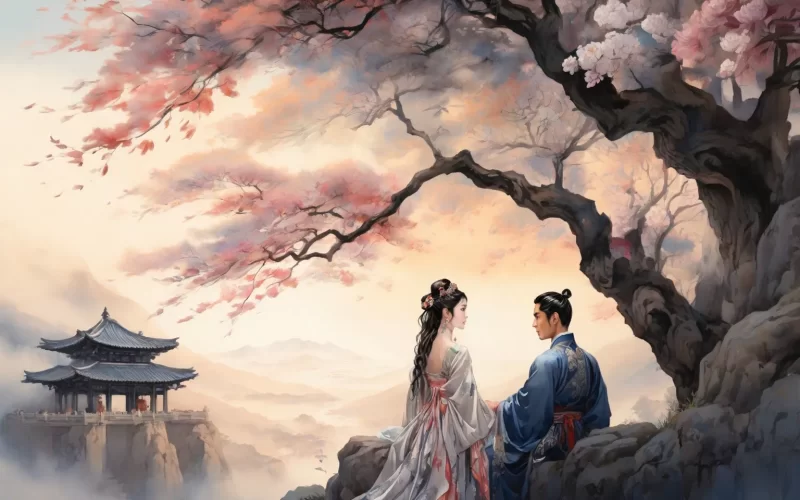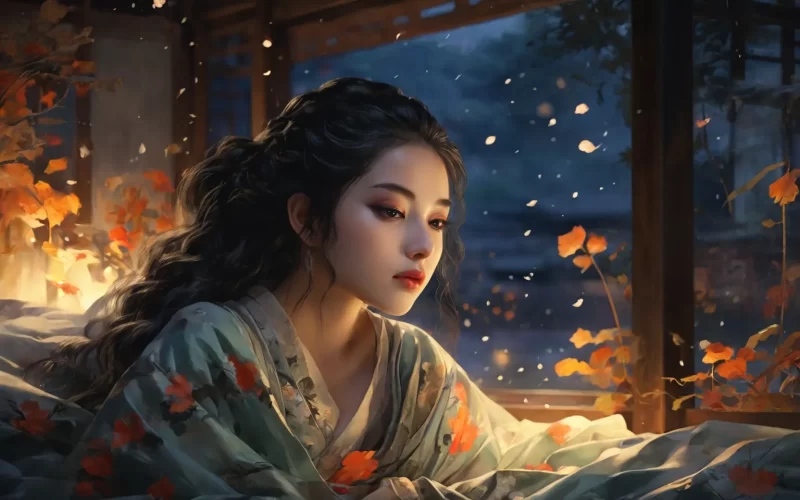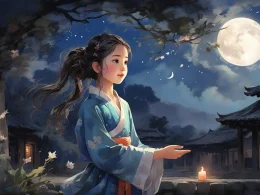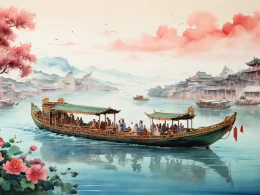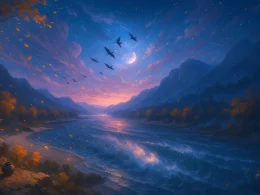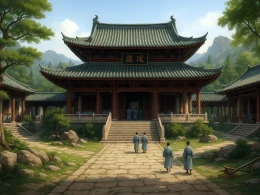I was bidding a guest farewell, at night on the Hsun-yang River,
Where maple-leaves and full-grown rushes rustled in the autumn.
I, the host, had dismounted, my guest had boarded his boat,
And we raised our cups and wished to drink -but, alas, there was no music.
For all we had drunk we felt no joy and were parting from each other,
When the river widened mysteriously toward the full moon -
We had heard a sudden sound, a guitar across the water.
Host forgot to turn back home, and guest to go his way.
We followed where the melody led and asked the player's name.
The sound broke off... then reluctantly she answered.
We moved our boat near hers, invited her to join us,
Summoned more wine and lanterns to recommence our banquet.
Yet we called and urged a thousand times before she started toward us,
Still hiding half her face from us behind her guitar.
...She turned the tuning-pegs and tested several strings;
We could feel what she was feeling, even before she played:
Each string a meditation, each note a deep thought,
As if she were telling us the ache of her whole life.
She knit her brows, flexed her fingers, then began her music,
Little by little letting her heart share everything with ours.
She brushed the strings, twisted them slow, swept them, plucked them -
First the air of The Rainbow Skirt, then The Six Little Ones.
The large strings hummed like rain,
The small strings whispered like a secret,
Hummed, whispered - and then were intermingled
Like a pouring of large and small pearls into a plate of jade.
We heard an oriole, liquid, hidden among flowers.
We heard a brook bitterly sob along a bank of sand.
By the checking of its cold touch, the very string seemed broken
As though it could not pass; and the notes, dying away
Into a depth of sorrow and concealment of lament,
Told even more in silence than they had told in sound
A silver vase abruptly broke with a gush of water,
And out leapt armoured horses and weapons that clashed and smote-
And, before she laid her pick down, she ended with one stroke,
And all four strings made one sound, as of rending silk . . . .
There was quiet in the east boat and quiet in the west,
And we saw the white autumnal moon enter the river's heart .
. . . When she had slowly placed the pick back among the strings,
She rose and smoothed her clothing and, formal, courteous,
Told us how she had spent her girlhood at the capital,
Living in her parents' house under the Mount of Toads,
And had mastered the guitar at the age of thirteen,
With her name recorded first in the class-roll of musicians,
Her art the admiration even of experts,
Her beauty the envy of all the leading dancers,
How noble youths of Wu-ling had lavishly competed
And numberless red rolls of silk been given for one song,
And silver combs with shell inlay been snapped by her rhythms,
And skirts the colour of blood been spoiled with stains of wine...
Season after season, joy had followed joy,
Autumn moons and spring winds had passed without her heeding,
Till first her brother left for the war, and then her aunt died,
And evenings went and evenings came, and her beauty faded -
With ever fewer chariots and horses at her door;
So that finally she gave herself as wife to a merchant
Who, prizing money first, careless how he left her,
Had gone, a month before, to Fou-liang to buy tea.
And she had been tending an empty boat at the river's mouth,
No company but the bright moon and the cold water.
And sometimes in the deep of night she would dream of her triumphs
And be wakened from her dreams by the scalding of her tears .
...Her very first guitar-note had started me sighing;
Now, having heard her story, I was sadder still.
"We are both unhappy - to the sky's end.
We meet. We understand. What does acquaintance matter?
I came, a year ago, away from the capital
And am now a sick exile here in Kiu-kiang -
And so remote is Kiu-kiang that I have heard no music,
Neither string nor bamboo, for a whole year.
My quarters, near the River Town, are low and damp,
With bitter reeds and yellowed rushes all about the house.
And what is to be heard here, morning and evening? -
The bleeding cry of cuckoos, the whimpering of apes.
On flowery spring mornings and moonlit autumn nights
I have often taken wine up and drunk it all alone,
Of course there are the mountain songs and the village pipes,
But they are crude and strident, and grate on my ears.
And tonight, when I heard you playing your guitar,
I felt as if my hearing were bright with fairy-music.
Do not leave us. Come, sit down. Play for us again.
And I will write you a ballad to the tune you have just sung."
Moved by what I said, she stood there for a moment,
Then sat again to her strings - and they sounded even sadder,
Although the tunes were different from those she had played before...
The feasters, all listening, covered their faces.
But who of them all was crying the most?
This Kiu-kiang official. My blue sleeve was wet.
Original Poem:
「琵琶行」
白居易
浔阳江头夜送客,枫叶荻花秋瑟瑟。
主人下马客在船,举酒欲饮无管弦。
醉不成欢惨将别,别时茫茫江浸月。
忽闻水上琵琶声,主人忘归客不发。
寻声暗问弹者谁?琵琶声停欲语迟。
移船相近邀相见,添酒回灯重开宴。
千呼万唤始出来,犹抱琵琶半遮面。
转轴拨弦三两声,未成曲调先有情。
弦弦掩抑声声思,似诉平生不得志。
低眉信手续续弹,说尽心中无限事。
轻拢慢捻抹复挑,初为《霓裳》后《六幺》。
大弦嘈嘈如急雨,小弦切切如私语。
嘈嘈切切错杂弹,大珠小珠落玉盘。
间关莺语花底滑,幽咽泉流冰下难。
冰泉冷涩弦凝绝,凝绝不通声暂歇。
别有幽愁暗恨生,此时无声胜有声。
银瓶乍破水浆迸,铁骑突出刀枪鸣。
曲终收拨当心画,四弦一声如裂帛。
东船西舫悄无言,唯见江心秋月白。
沉吟放拨插弦中,整顿衣裳起敛容。
自言本是京城女,家在虾蟆陵下住。
十三学得琵琶成,名属教坊第一部。
曲罢曾教善才服,妆成每被秋娘妒。
五陵年少争缠头,一曲红绡不知数。
钿头银篦击节碎,血色罗裙翻酒污。
今年欢笑复明年,秋月春风等闲度。
弟走从军阿姨死,暮去朝来颜色故。
门前冷落鞍马稀,老大嫁作商人妇。
商人重利轻别离,前月浮梁买茶去。
去来江口守空船,绕船月明江水寒。
夜深忽梦少年事,梦啼妆泪红阑干。
我闻琵琶已叹息,又闻此语重唧唧。
同是天涯沦落人,相逢何必曾相识!
我从去年辞帝京,谪居卧病浔阳城。
浔阳地僻无音乐,终岁不闻丝竹声。
住近湓江地低湿,黄芦苦竹绕宅生。
其间旦暮闻何物?杜鹃啼血猿哀鸣。
春江花朝秋月夜,往往取酒还独倾。
岂无山歌与村笛?呕哑嘲哳难为听。
今夜闻君琵琶语,如听仙乐耳暂明。
莫辞更坐弹一曲,为君翻作琵琶行。
感我此言良久立,却坐促弦弦转急。
凄凄不似向前声,满座重闻皆掩泣。
座中泣下谁最多?江州司马青衫湿。
Interpretation:
"The song of a Guitar" was written by Bai Juyi when he was demoted to Jiangzhou as a Sima, around the autumn of the 11th year of the Yuanhe era (816). The poet was exiled to Xunyang (present-day Jiujiang, Jiangxi) due to his direct remonstrations and found himself disheartened and unfulfilled. While bidding farewell to a friend, he happened upon the sound of a pipa played by a woman. After conversing with her, he learned that she had once been a famous courtesan in the capital but had fallen into obscurity with age. This encounter deeply resonated with Bai Juyi, as he saw in her misfortune a reflection of his own fate. Thus, he wrote this poem to express his sorrow and frustration at the vicissitudes of life.
First paragraph
“浔阳江头夜送客,枫叶荻花秋瑟瑟。”
At night, I bid my friend farewell on the banks of the Xunyang River. The maple leaves fall, the reeds sway, and the autumn wind sighs, adding to the melancholy of parting.
“主人下马客在船,举酒欲饮无管弦。”
The host steps down from his horse, while the guest waits on the departing boat. We raise our cups for a final drink, but without music, the moment feels even more desolate.
“醉不成欢惨将别,别时茫茫江浸月。”
Though we drink, we find no joy, for the sorrow of parting lingers. As we bid farewell, the vast river reflects the moon, deepening the sense of loneliness.
“忽闻水上琵琶声,主人忘归客不发。”
Suddenly, a sound of the pipa drifts from the water. We are captivated—neither the host departs nor the guest embarks.
“寻声暗问弹者谁?琵琶声停欲语迟。”
We quietly ask about the player behind the melody. The music ceases, but the player hesitates to speak.
“移船相近邀相见,添酒回灯重开宴。”
We move our boat closer and invite her to join us. More wine is poured, the lamps are relit, and the gathering resumes.
“千呼万唤始出来,犹抱琵琶半遮面。”
After much urging, she finally appears, still holding her pipa, half-covering her face in shyness or sorrow.
Second paragraph
“转轴拨弦三两声,未成曲调先有情。”
She turns the tuning pegs and plucks a few strings; even before the melody forms, emotion flows through each note.
“弦弦掩抑声声思,似诉平生不得志。”
Every string echoes restraint, every note carries longing, as if lamenting a life of unfulfilled aspirations.
“低眉信手续续弹,说尽心中无限事。”
With downcast eyes, she plays continuously, telling unspoken tales of her heart through music.
“轻拢慢捻抹复挑,初为霓裳后六幺。”
She gently plucks, slowly pinches, and skillfully flicks the strings—beginning with "The Rainbow Skirt," then transitioning into "Six Yao."
“大弦嘈嘈如急雨,小弦切切如私语。”
The thick strings resound like sudden rain, while the thin ones whisper like a lover’s murmur.
“嘈嘈切切错杂弹,大珠小珠落玉盘。”
The mingling notes alternate, crisp and rich, like pearls—large and small—scattering onto a jade plate.
“间关莺语花底滑,幽咽泉流冰下难。”
The melody flows like a warbler’s song gliding beneath flowers, then turns sorrowful, like a stream struggling under ice.
“冰泉冷涩弦凝绝,凝绝不通声渐歇。”
The icy springs stiffen; the strings grow tense, faltering—until the sound slowly fades into silence.
“别有幽愁暗恨生,此时无声胜有声。”
A deep sorrow arises in the hush. At this moment, silence speaks louder than sound.
“银瓶乍破水浆迸,铁骑突出刀枪鸣。”
Suddenly, the music erupts like a silver flask shattering, water bursting forth—like cavalry charging with clashing blades.
“曲终收拨当心画,四弦一声如裂帛。”
At the song’s end, she swiftly draws her pick across the strings, the final note ripping through the air like torn silk.
“东船西舫悄无言,唯见江心秋月白。”
The boats to the east and west fall into silence—nothing remains but the autumn moon shining over the river.
Third paragraph
“沉吟放拨插弦中,整顿衣裳起敛容。”
She pauses, lost in thought, then sets her pick between the strings. Adjusting her attire, she stands with a composed demeanor.
“自言本是京城女,家在虾蟆陵下住。”
"I was once a girl from the capital," she says, "born near Xiamaling."
“十三学得琵琶成,名属教坊第一部。”
"I mastered the pipa at thirteen, earning fame among the finest musicians of the court."
“曲罢曾教善才服,妆成每被秋娘妒。”
"My music once captivated even the most skilled players, and my beauty stirred envy among the courtesans."
“五陵年少争缠头,一曲红绡不知数。”
"The noble youths of the Five Tombs vied to shower me with gifts, their red silk handkerchiefs countless after just one song."
“钿头银篦击节碎,血色罗裙翻酒污。”
"Ornaments of gold and silver once tapped time to my music, but now, my crimson silk dress is stained with spilled wine."
“今年欢笑复明年,秋月春风等闲度。”
"Year after year, laughter filled my days, as autumn moons and spring breezes passed in heedless pleasure."
“弟走从军阿姨死,暮去朝来颜色故。”
"Then my brother went to war, my aunt passed away, and as days and nights slipped by, my beauty faded."
“门前冷落车马稀,老大嫁作商人妇。”
"No longer did carriages and horses frequent my door. In the end, I married a merchant, growing old at his side."
“商人重利轻别离,前月浮梁买茶去。”
"Merchants chase profit and care little for parting. Last month, he left for Fuliang to trade tea."
“去来江口守空船,绕船月明江水寒。”
"Now I guard this empty boat at the river’s edge, with only the moon and the cold water for company."
“夜深忽梦少年事,梦啼妆泪红阑干。”
"At night, I dream of my youthful days, but wake in tears—my rouge-streaked face leaning against the railing."
Fourth paragraph
“我闻琵琶已叹息,又闻此语重唧唧。”
Hearing the sound of your pipa, I could not help but sigh. Now, upon listening to your words, my sorrow deepens even further.
“同是天涯沦落人,相逢何必曾相识。”
You and I are both wanderers, adrift in this vast world. Having met today, what need is there for us to have known each other before?
“我从去年辞帝京,谪居卧病浔阳城。”
Since last year, I have left the imperial capital, exiled to Xunyang, where I dwell alone, afflicted by illness.
“浔阳地僻无音乐,终岁不闻丝竹声。”
Xunyang is remote and desolate, where the melodies of strings and flutes are never heard throughout the year.
“住近湓江地低湿,黄芦苦竹绕宅生。”
My dwelling is near the Pen River, where the land is low and damp, surrounded by yellow reeds and bitter bamboo.
“其间旦暮闻何物?杜鹃啼血猿哀鸣。”
From dawn till dusk, what sounds fill my ears? The sorrowful cries of cuckoos and the mournful wails of monkeys.
“春江花朝秋月夜,往往取酒还独倾。”
During spring mornings when flowers bloom by the river, and autumn nights when the moon hangs high, I often take up my wine and drink alone.
“岂无山歌与村笛?呕哑嘲哳难为听。”
There may be rustic songs and village flutes, yet their coarse and discordant sounds are difficult to endure.
“今夜闻君琵琶语,如听仙乐耳暂明。”
Tonight, hearing the music of your pipa, it is as if I am listening to celestial melodies—my ears are suddenly awakened, my soul deeply moved.
“莫辞更坐弹一曲,为君翻作《琵琶行》。”
Please do not refuse; play another piece for us. In return, I shall compose ‘The Song of the Pipa’ for you.
“感我此言良久立,却坐促弦弦转急。”
Hearing my words, she stood in silence for a long while, then sat down again, tightening her strings as the melody grew urgent.
“凄凄不似向前声,满座重闻皆掩泣。”
The music, now even more sorrowful than before, moved everyone present to tears once again.
“座中泣下谁最多?江州司马青衫湿。”
And among them, who wept the most? It was none other than me—the exiled Governor of Jiangzhou, with my robes drenched in tears.
Writing Characteristics:
- A well-structured narrative with progressive emotions: The poem unfolds chronologically, starting with the initial performance, followed by the poet’s self-disclosure, and concluding with their emotional resonance. The gradual buildup of emotions creates a layered and immersive experience.
- Vivid and delicate musical depictions: The poet employs rich metaphors to illustrate the beauty of the pipa’s melodies, making the reader feel as if they are listening firsthand.
- A blend of realism and sentiment: The hardships of the pipa player reflect the poet’s own suffering in exile, intertwining personal fate with broader societal injustices.
- Elegant language and genuine emotions: Through parallelism and metaphor, the poem achieves a refined, fluid style while conveying deep and heartfelt sorrow.
Overall Appreciation:
"The Song of the Pipa" is a masterpiece that masterfully blends narrative and lyricism. Centered around the performance and tragic past of the pipa player, the poem serves as a poignant mirror to the poet’s own suffering in exile. Beyond portraying the pipa’s enchanting melodies, it also reveals the harsh realities of a feudal society that oppresses artists and outcasts alike. The famous line “We are both wanderers, adrift in this world” elevates personal sorrow to a universal lament on human fate, granting the poem profound social significance.
Insights:
The story of the pipa player is not just a personal tragedy—it echoes Bai Juyi’s own exile, reflecting the loneliness and sorrow of those abandoned by fate. Despite their different backgrounds, both the poet and the musician are “drifters at the world’s edge,” finding solace in each other’s pain. With exquisite detail, the poet captures the contrast between past glory and present desolation, weaving an elegy for lost dreams and forsaken souls. More than a simple music narrative, this poem serves as a profound meditation on life’s impermanence and the cruelty of society, leaving readers deeply moved.
Poem translator:
Kiang Kanghu
About the poet:
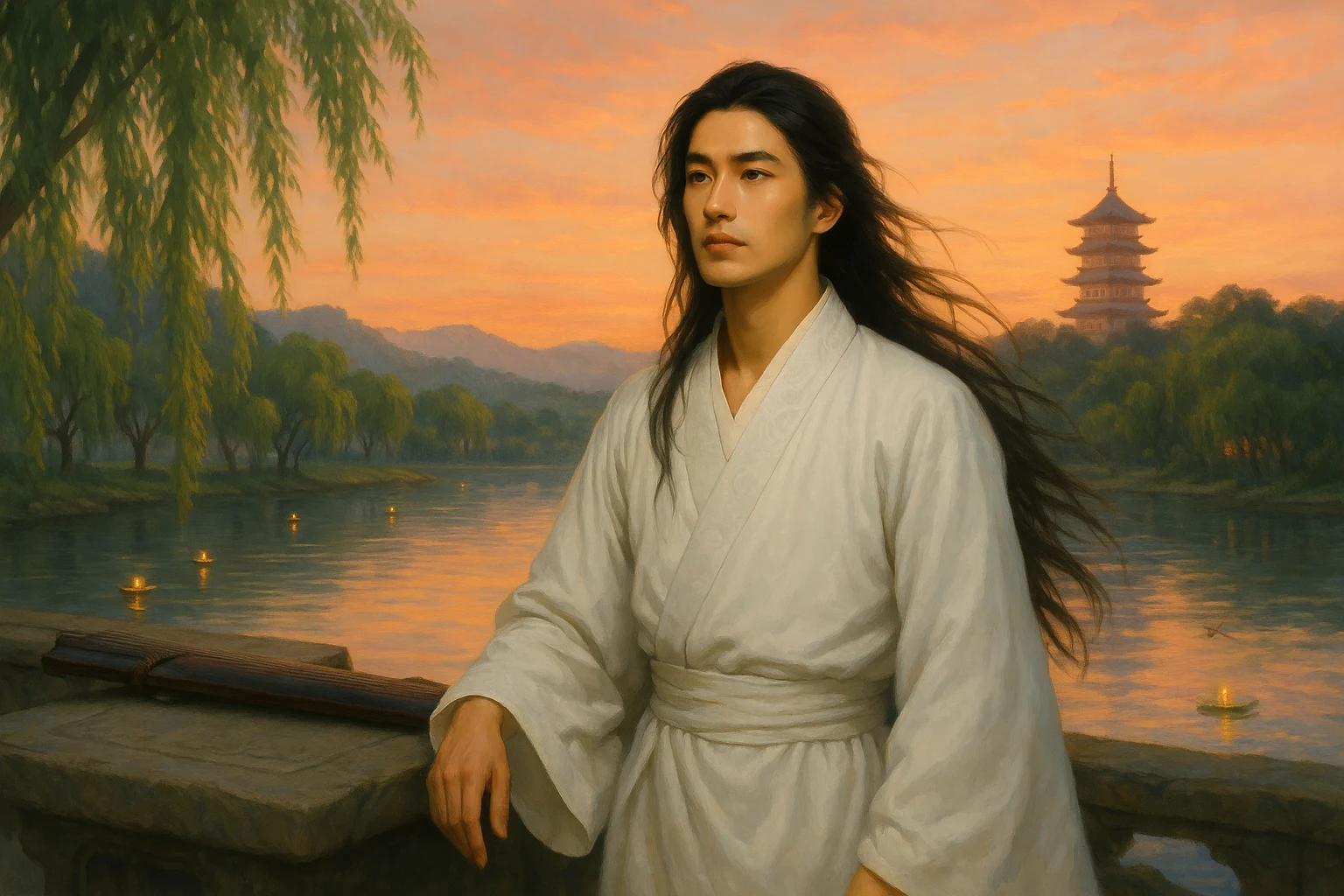
Bai Juyi (白居易), 772-846 AD, was originally from Taiyuan, then moved to Weinan in Shaanxi. Bai Juyi was the most prolific poet of the Tang Dynasty, with poems in the categories of satirical oracles, idleness, sentimentality, and miscellaneous rhythms, and the most influential poet after Li Bai Du Fu.






